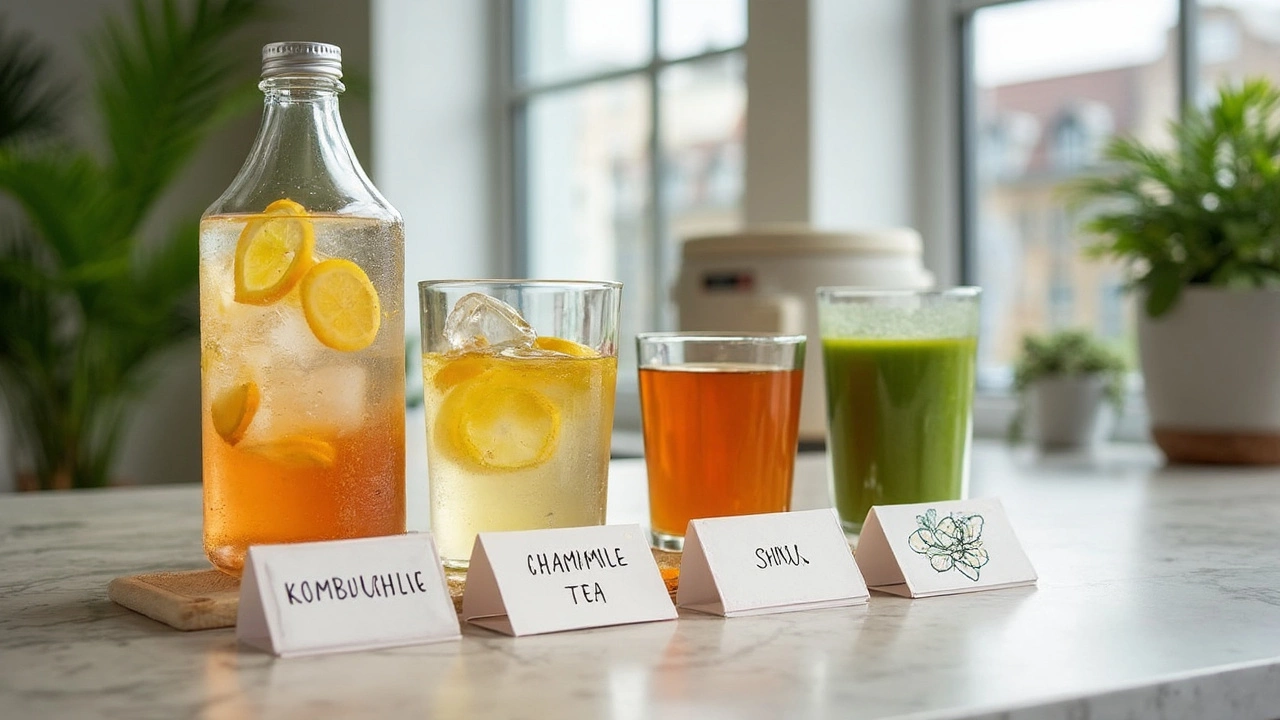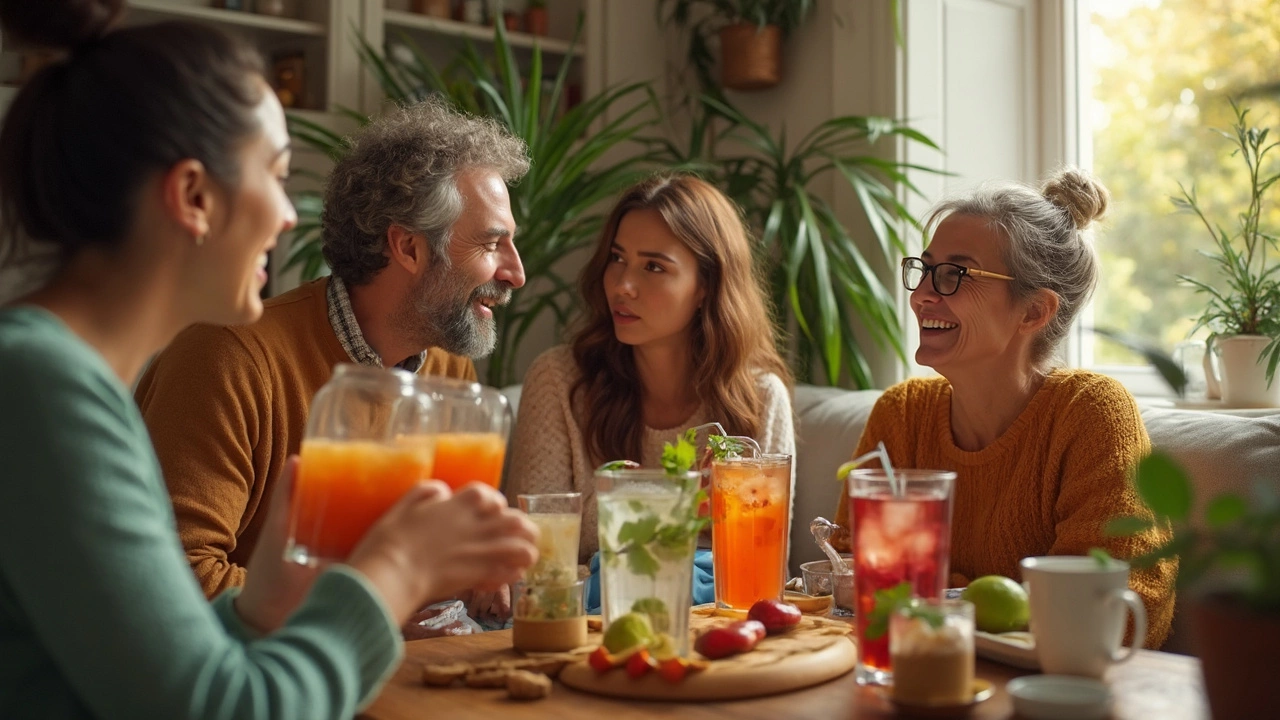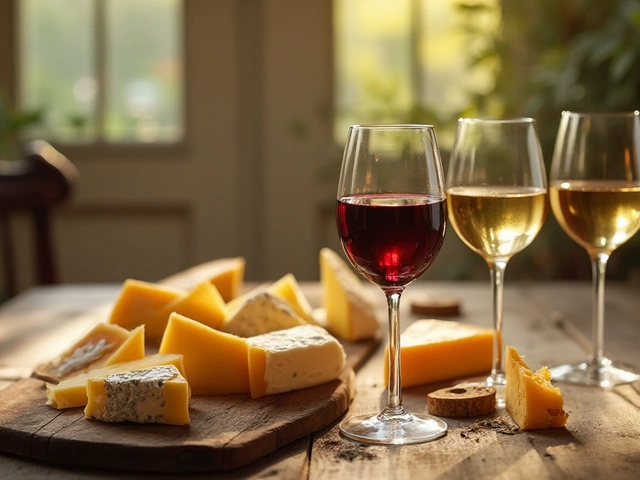Ever catch yourself reaching for a drink just to slow things down at the end of a rough week? You're not alone. The thing is, alcohol might make you feel good for an hour, but it tends to mess with your sleep, mood, and even stress levels after the buzz wears off.
Good news: non-alcoholic drinks aren’t just boring sodas or plain water. There are actually a bunch of tasty, simple drinks—like tart cherry juice, chamomile tea, or even magnesium-rich mocktails—that can help calm your nerves and get your mind off work. Some brands even make “functional” drinks packed with calming herbs, so you get that soothing ritual, minus the hangover or regret.
It’s not just about swapping your gin and tonic for a fancy glass of juice, though. Setting up a proper chill-out routine can make a difference, too. Whether that means brewing a mug of herbal tea or getting into a quick breathing exercise, these small changes work together to help you relax—no alcohol needed.
- Why Alcohol Isn’t the Best Chill-Out Plan
- Science-Backed Non-Alcoholic Relaxation Drinks
- Quick and Easy Ways to Unwind Without Booze
- How to Make Relaxation a Daily Habit
Why Alcohol Isn’t the Best Chill-Out Plan
A lot of people think a beer or a glass of wine is the fastest way to relax after a long day. Sure, it feels nice at first, but there’s a catch—alcohol actually makes your body work harder in the long run.
Here’s what really happens when you drink: your brain releases more of a chemical called GABA, which slows you down and chills you out. The problem? Once that wears off, your brain kicks up stress hormones (like cortisol), and that can leave you more wired than when you started. Ever wondered why you wake up at 3am after a night of drinks, tossing and turning? Alcohol messes with your REM sleep, making you feel groggy and even more anxious the next day.
There’s also a link between regular drinking for relaxation and higher risks of mood swings, depression, and even memory trouble over time. Not to mention, if you end up relying on alcohol every time you’re stressed, your body builds up tolerance. That means you need more to get the same effect—and that’s a slippery slope.
And here’s the part most people miss: alcohol dehydrates your body, making headaches and next-day irritability way more common. On the flip side, swapping in non-alcoholic drinks and healthy relaxation habits lets you actually recharge, instead of just numbing the stress for a bit.
- Alcohol disrupts sleep and makes it harder to reset after stress.
- It can lead to bigger problems like anxiety or bad moods.
- Long-term use as a relaxer ramps up the risk of health issues.
There’s nothing wrong with wanting to unwind. But depending on alcohol to do it usually leads to more problems than it fixes. That’s why it pays to look for other chill-out methods that actually help your mind and body bounce back.
Science-Backed Non-Alcoholic Relaxation Drinks
Seriously, you don’t have to stick with water or sodas if you want to feel calmer. Some non-alcoholic drinks are loaded with stuff that actually helps your body and brain chill out. Let’s break down what the science says about a few of the best ones.
- Chamomile Tea: It’s famous for a reason. Real research shows chamomile can help lower anxiety and make it easier to sleep. One study found that drinking chamomile tea twice a day made people feel less nervous after just four weeks.
- Tart Cherry Juice: Not just for old folks! Tart cherry juice is loaded with melatonin, which helps you wind down at night. A clinical trial showed it improved sleep time by up to 84 minutes a night for some adults.
- Magnesium Mocktails: Drinks made with magnesium powder are popping up everywhere. Magnesium helps relax your muscles and can knock down stress. There’s real science backing how magnesium impacts nervous system chill.
- Kava Drinks: These are big in places like Fiji and Hawaii. Kava root has been shown to help people relax without making them feel out of it. A 2023 review found kava can work just as well as some prescription anxiety meds, but without that heavy feeling.
- Lemon Balm Iced Tea: Lemon balm is a part of the mint family, and studies link it to decreased anxiety and better sleep. It’s also super refreshing when cold.
Some brands have started blending these ingredients with bubbly water and fruit, so you get functional "social tonics" that look and taste legit in a wine glass or fancy tumbler. They usually skip added sugars, too, unlike store-bought sodas or energy drinks. Keep an eye out, though—labels like ‘adaptogen’ or ‘natural relaxer’ aren’t regulated super tightly. Stick with drinks that show their ingredient list and actual research.
Here’s a quick reference to show what each non-alcoholic drink can do for your chill factor:
| Drink | Main Benefit | Best Time to Drink |
|---|---|---|
| Chamomile Tea | Reduces anxiety, helps you sleep | Evening |
| Tart Cherry Juice | Boosts melatonin, better sleep | 1-2 hours before bed |
| Magnesium Mocktail | Calms nerves, relaxes muscles | Afternoon or evening |
| Kava Drink | Deep relaxation, fights stress | After work or before winding down |
| Lemon Balm Iced Tea | Lifts mood, reduces tension | Afternoon or early evening |
If you want to get started, it’s honestly just as simple as tossing a herbal tea bag or two into hot water or blending tart cherry juice with sparkling water. No mixology skills required.

Quick and Easy Ways to Unwind Without Booze
If you think unwinding after work means pouring a drink, you're missing out on a bunch of easier (and better for you) options. And you can actually feel more relaxed, longer—without the rough side effects of alcohol.
- Relaxation drinks: These are getting more popular and aren’t just herbal teas. Drinks with magnesium, B vitamins, or L-theanine (like in green tea) have real science behind them. L-theanine, for example, has been shown to boost alpha brain waves—that’s the relaxed-but-alert vibe you want.
- Breathing hacks: A five-minute breathing exercise can knock your stress down fast. Try box breathing (breathe in for four counts, hold for four, out for four, hold for four—repeat). It works because it signals your body to chill out. The Navy SEALs train with this.
- Move a little: Not talking about running a marathon here. Just a ten-minute stretching session or walk around the block lowers cortisol (the stress hormone) and clears your head.
- Switch up your drink: Cravings for a ritual are real. Swap your evening beer or wine for a glass of tart cherry juice over ice, a sparkling water with a wedge of lime, or even a mocktail with ginger and mint. Tart cherry juice, for example, is proven to help people sleep better and reduce muscle soreness.
- Screen-free time: Put your phone down for half an hour and your brain will get the message that it’s time to power down. Blue light from screens keeps your mind buzzing, making it tougher to actually relax.
Here’s a quick look at how fast these techniques can help you feel the difference compared to a glass of alcohol:
| Unwind Method | Onset of Calm | Side Effects |
|---|---|---|
| Alcohol | Within 15-30 min | Poor sleep, next-day grogginess |
| Breathing Exercise | 5-10 min | None |
| Stretching/Light Movement | 10-15 min | Improved mood, no negatives |
| Magnesium/L-theanine Drink | 20-30 min | No hangover, better sleep |
The best part? These methods actually help your body handle stress instead of just covering it up. Try stacking a couple on the same night—like a walk, then a calming drink. Odds are you’ll notice you sleep better, your head feels clearer, and you don’t miss the booze at all.
How to Make Relaxation a Daily Habit
Building new habits is tough, but relaxing every day shouldn’t be another chore on your to-do list. You can slip these routines into your day without needing a ton of time—or motivation. The trick is keeping it simple and sticking with what actually feels good for you.
Let’s break it down. Scheduling a short relaxation break every day is a proven way to lower stress. Research from Harvard Medical School suggests that just 10 minutes of a calming activity—like sipping a cup of herbal tea or practicing controlled breathing—can help cut down on anxiety and boost your mood right away. It’s not just some mindful wishful thinking, either. Getting into these routines resets your body’s stress response, making it easier to wind down naturally.
- Pick one relaxing drink you like. Brew it at the same time each day—maybe when you get home from work or right before bed. Consistency signals your brain it’s time to chill out.
- Combine your drink with a simple routine: turn down the lights, put your phone away, and play music that helps you unplug.
- Try a quick wind-down activity: basic stretching, a mini walk, or even reading a book for 10 minutes.
- Skip the multitasking. Your brain needs a clear signal that this is downtime, not just regular scrolling with a seltzer in your hand.
For context, here’s a look at what people say actually helps them relax most after work, according to a 2023 survey by Statista:
| Activity | % Who Found It Helpful |
|---|---|
| Drinking herbal tea | 38 |
| Listening to music | 34 |
| Taking a walk | 29 |
| Meditation or breathing | 22 |
| Non-alcoholic relaxation drinks | 19 |
It’s not about making some big change overnight. Just tack these habits onto things you already do—like right after dinner or following your evening shower. Over time, that little act becomes something your brain expects, and it gets easier to relax without even thinking about alcohol. If you need an extra nudge, set a quick reminder or put out your favorite mug as a cue. Before you know it, unwinding becomes just another part of your day.


